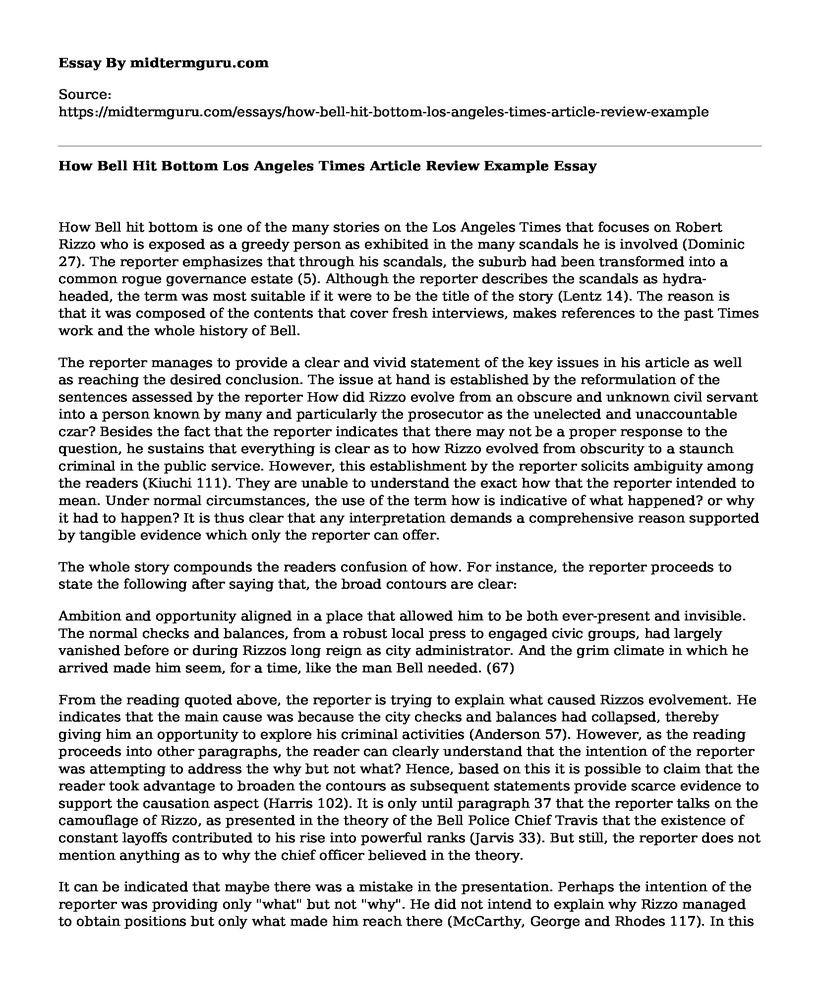How Bell hit bottom is one of the many stories on the Los Angeles Times that focuses on Robert Rizzo who is exposed as a greedy person as exhibited in the many scandals he is involved (Dominic 27). The reporter emphasizes that through his scandals, the suburb had been transformed into a common rogue governance estate (5). Although the reporter describes the scandals as hydra-headed, the term was most suitable if it were to be the title of the story (Lentz 14). The reason is that it was composed of the contents that cover fresh interviews, makes references to the past Times work and the whole history of Bell.
The reporter manages to provide a clear and vivid statement of the key issues in his article as well as reaching the desired conclusion. The issue at hand is established by the reformulation of the sentences assessed by the reporter How did Rizzo evolve from an obscure and unknown civil servant into a person known by many and particularly the prosecutor as the unelected and unaccountable czar? Besides the fact that the reporter indicates that there may not be a proper response to the question, he sustains that everything is clear as to how Rizzo evolved from obscurity to a staunch criminal in the public service. However, this establishment by the reporter solicits ambiguity among the readers (Kiuchi 111). They are unable to understand the exact how that the reporter intended to mean. Under normal circumstances, the use of the term how is indicative of what happened? or why it had to happen? It is thus clear that any interpretation demands a comprehensive reason supported by tangible evidence which only the reporter can offer.
The whole story compounds the readers confusion of how. For instance, the reporter proceeds to state the following after saying that, the broad contours are clear:
Ambition and opportunity aligned in a place that allowed him to be both ever-present and invisible. The normal checks and balances, from a robust local press to engaged civic groups, had largely vanished before or during Rizzos long reign as city administrator. And the grim climate in which he arrived made him seem, for a time, like the man Bell needed. (67)
From the reading quoted above, the reporter is trying to explain what caused Rizzos evolvement. He indicates that the main cause was because the city checks and balances had collapsed, thereby giving him an opportunity to explore his criminal activities (Anderson 57). However, as the reading proceeds into other paragraphs, the reader can clearly understand that the intention of the reporter was attempting to address the why but not what? Hence, based on this it is possible to claim that the reader took advantage to broaden the contours as subsequent statements provide scarce evidence to support the causation aspect (Harris 102). It is only until paragraph 37 that the reporter talks on the camouflage of Rizzo, as presented in the theory of the Bell Police Chief Travis that the existence of constant layoffs contributed to his rise into powerful ranks (Jarvis 33). But still, the reporter does not mention anything as to why the chief officer believed in the theory.
It can be indicated that maybe there was a mistake in the presentation. Perhaps the intention of the reporter was providing only "what" but not "why". He did not intend to explain why Rizzo managed to obtain positions but only what made him reach there (McCarthy, George and Rhodes 117). In this case, it is difficult for the reader to analyze such argument critically. Besides, the reporter indicates that he did not want to give an all-encompassing accountability. The qualification, therefore, renders his argument immune to any criticism, especially based on the timeline given.
Works Cited
Anderson, Bonnie. News flash: journalism, infotainment, and the bottom-line business of broadcast news. San Francisco: Jossey-Bass, 2004. Print.
Dominic, Serene. Burt Bacharach, song by song: the ultimate Burt Bacharach reference for fans, serious record collectors, and music critics. New York: Schirmer Trade Books Music Sales Corp. distributor, 2003. Print.
Harris, Roy J. Pulitzer's gold: a century of public service journalism. New York: Columbia University Press, 2016. Print.
Jarvis, G. K. The unknown. Victoria, B.C: Trafford, 2003. Print.
Kiuchi, Yuya. Race still matters the reality of African American lives and the myth of postracial society. Albany: State University of New York Press, 2016. Print.
Lentz, Harris M. Obituaries in the performing arts, 2005: film, television, radio, theater, dance, music, cartoons and pop culture. Jefferson, N.C: McFarland & Co, 2006. Print.
McCarthy, George E., and Royal W. Rhodes. Eclipse of justice: ethics, economics, and the lost traditions of American Catholicism. Eugene, OR: Wipf and Stock, 2008. Print.
Cite this page
How Bell Hit Bottom Los Angeles Times Article Review Example. (2021, Jun 11). Retrieved from https://midtermguru.com/essays/how-bell-hit-bottom-los-angeles-times-article-review-example
If you are the original author of this essay and no longer wish to have it published on the midtermguru.com website, please click below to request its removal:
- Analysis of A View From the Bridge by Cherokee Paul McDonald - Paper Example
- Essay on Biography of Lorna Simpson
- Essays on the YouTube Monetizing and the Internets Impact on the News
- Introduction to Public Opinion and Propaganda - Research Paper
- Graffiti: Art or Vandalism? - Essay Sample
- Politics & Media: United in Existence & Affecting Each Other - Essay Sample
- Robot Reporters: Implication on Job Availability in Media - Essay Sample







